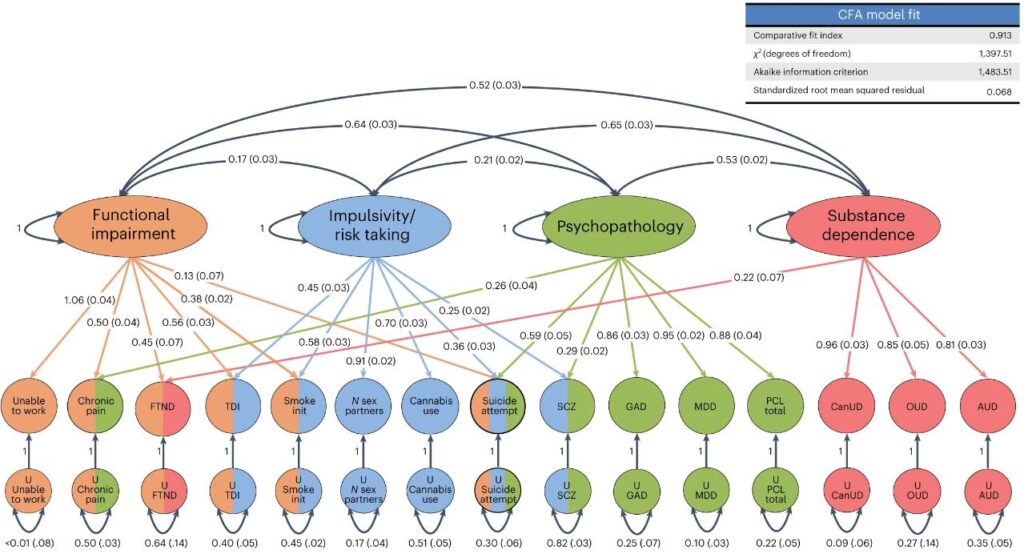Possible Genomic Links to Psychiatric Issue, Other Substance Abuse

Click to Enlarge: gSEM was used to cluster 14 traits correlated with CanUD. Exploratory and confirmatory factor analysis indicated four factors fit the data best. Factors fit mostly into categories that we designated as functional impairment (factor 1), impulsivity and risk taking (factor 2), psychopathology (factor 3) and substance dependence (factor 4). CanUD fit best (and strongly) in the substance dependence cluster. FTND fit into factors for functional impairment and substance dependence. Suicide attempts fit into functional impairment, impulsivity and risk taking, and psychopathology. Numbers outside the parenthesis are correlation coefficients between factors. Numbers inside parenthesis are stadard errors of means. Smoke init, initiation of regular smoking; GAD, generalized anxiety disorder; OUD, opioid use disorder. Source: Nature Genetics
NEW HAVEN, CT — A study using data from the VA’s Million Veteran Program raised serious concerns about risks associated with cannabis use.
The Yale University-led analysis of the genomes of more than 1 million veterans focused a spotlight on the underlying biology of cannabis-use disorder. It also highlighted the condition’s links to psychiatric disorders, abuse of other substances such as tobacco and raised the specter of an elevated risk of developing lung cancer.
For the study published in Nature Genetics, researchers examined a genome-wide set of genetic variants in veterans from multiple ancestry groups as contained in the Million Veterans Program, one of the world’s largest genetic databases. The researchers incorporated additional information from several other genomic databases.1
As a result, the study team identified dozens of genetic variants linked to cannabis-use disorder and a variety of behavioral and health issues associated with cannabis-use disorder. The VA was one of the study funders.
“Once we understand the biology of cannabis-use disorder, we can better understand associated disorders and inform the public of risks associated with marijuana use,” said lead author Daniel Levey, PhD, assistant professor of psychiatry at Yale Medical School and in the Department of Psychiatry at the VA Connecticut Healthcare Center in West Haven, CT. Joel Gelernter, MD, the Foundation’s Fund Professor of Psychiatry and professor of genetics and of neuroscience, was the co-study leader.
The report pointed out that marijuana is the most commonly used federally illegal drug in the United States, with more than 48 million people (18% of Americans) using it at least once in 2019, according to the national Centers for Disease Control and Prevention.
The authors cited previous research indicating that about one-third of marijuana users develop cannabis-use disorder, which is defined as a problematic pattern of cannabis use leading to clinically significant impairment or distress.
The findings are evidence that cannabis addiction “could have substantial public-health risks if the usage increases,” Levey said.
Increasing Disorder
He and his co-authors raised concerns that, as recreational use of cannabis is being decriminalized in many places and medical use widely sanctioned, cannabis-use disorder (CanUD) will only increase.
“Here we performed a genome-wide association study of CanUD in the Million Veteran Program (MVP), followed by meta-analysis in 1,054,365 individuals (ncases = 64,314) from four broad ancestries designated by the reference panel used for assignment (European n = 886,025, African n = 123,208, admixed American n = 38,289 and East Asian n = 6,843),” the researchers wrote. “Population-specific methods were applied to calculate single nucleotide polymorphism-based heritability within each ancestry. Statistically significant single nucleotide polymorphism-based heritability for CanUD was observed in all but the smallest population (East Asian).”
The authors said they discovered genome-wide significant loci unique to each ancestry: 22 in European, 2 each in African and East Asian, and 1 in admixed American ancestries.
“A genetically informed causal relationship analysis indicated a possible effect of genetic liability for CanUD on lung-cancer risk, suggesting potential unanticipated future medical and psychiatric public health consequences that require further study to disentangle from other known risk factors such as cigarette smoking,” they cautioned.
In essence, the study team found that variants of genes that encode for three different types of receptors on neurons were associated with elevated risk for developing cannabis-use disorder. It also found an association between the variants and the development of lung cancer. The authors explained that more work is required to separate the effects tobacco use and other environmental factors have on cancer diagnoses from those of marijuana use.
“This is the largest genome-wide study of cannabis use disorder ever conducted and as more states legalize or decriminalize the use of marijuana, such studies can help us to understand the public health risks that accompany its increased use,” Gelernter said in a Yale press release.
The study pointed out that using cannabis recreationally is legal in at least eight countries, and 48 countries have legalized medicinal use of the drug for conditions such as chronic pain, cancer and epilepsy.
Gelernter suggested in a journal news release that more information about the biological mechanisms that connect cannabis use with health conditions will provide a better evidence base for policy and medical practice.
- Levey DF, Galimberti M, Deak JD, Wendt FR. Multi-ancestry genome-wide association study of cannabis use disorder yields insight into disease biology and public health implications. Nat Genet. 2023 Nov 20. doi: 10.1038/s41588-023-01563-z. Epub ahead of print. PMID: 37985822.

